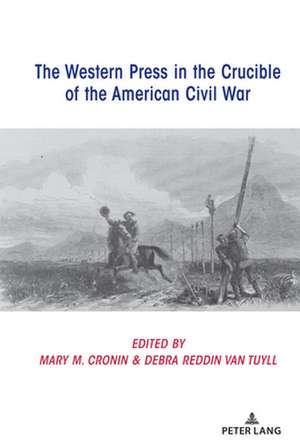Western Press in the Crucible of the American Civil War: Mediating American History
en Limba Engleză Hardback – 19 sep 2021
Din seria Mediating American History
- 8%
 Preț: 532.49 lei
Preț: 532.49 lei - 23%
 Preț: 626.05 lei
Preț: 626.05 lei - 23%
 Preț: 616.18 lei
Preț: 616.18 lei - 9%
 Preț: 657.74 lei
Preț: 657.74 lei - 27%
 Preț: 717.03 lei
Preț: 717.03 lei -
 Preț: 406.78 lei
Preț: 406.78 lei -
 Preț: 387.30 lei
Preț: 387.30 lei - 27%
 Preț: 694.66 lei
Preț: 694.66 lei - 9%
 Preț: 861.61 lei
Preț: 861.61 lei -
 Preț: 381.91 lei
Preț: 381.91 lei -
 Preț: 364.95 lei
Preț: 364.95 lei - 8%
 Preț: 444.44 lei
Preț: 444.44 lei - 9%
 Preț: 620.78 lei
Preț: 620.78 lei -
 Preț: 410.03 lei
Preț: 410.03 lei - 23%
 Preț: 643.73 lei
Preț: 643.73 lei - 20%
 Preț: 407.07 lei
Preț: 407.07 lei
Preț: 579.87 lei
Preț vechi: 753.08 lei
-23% Nou
110.96€ • 116.16$ • 91.81£
Carte tipărită la comandă
Livrare economică 05-19 aprilie
Specificații
ISBN-10: 1433175991
Pagini: 326
Dimensiuni: 150 x 225 x 26 mm
Greutate: 0.62 kg
Editura: Peter Lang Copyright AG
Seria Mediating American History
Notă biografică
Debra Reddin van Tuyll (Ph.D., University of South Carolina) is a professor of communication at Augusta University. She is winner of the AJHA Kobre Award for Lifetime Achievement in Journalism History and the Donald L. Shaw Award for Lifetime Achievement in Service to Journalism History.
Cuprins
Mary M. Cronin, Debra Reddin van Tuyll, and Bill Huntzicker: Introduction: Land. Lots of Land. And Newspapers, Too: Westward Migration and the Creation of Western Journalism - Debra Reddin van Tuyll: By the Numbers: Facts and Figures of Western Editors and Their Newspapers - Mary M. Cronin: "Give Us the War News!": News Gathering, Distribution, and Audiences - Glen Feighery and David J. Vergobbi: Press Roles and Functions: Community Building in the West - Erika J. Pribanic- Smith: No 'Cliques or Factions': Politics, Partisanship and the Press in the West - Crompton Burton: "Stirring Times": The Coming of the American Civil War in the Western Press - Mary M. Cronin: Acts of Disloyalty: Legal and Extralegal Restrictions on the Far Western Press in Wartime - Hubert van Tuyll: A Distant and Bloody Mirror: The Western Press and the Fighting - Jennifer E. Moore: From Sea to Shining Sea: Domestic and International News from the Plains to the Ocean - Katrina Quinn: "Words are Not Sufficient": The Western Press Reports the End of the War and the Death of Lincoln - Mary M. Cronin and Debra Reddin van Tuyll: Epilogue: In the Final Analysis: A Region of High- Risk Opportunity - Index.
